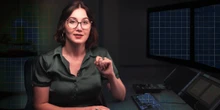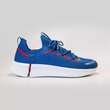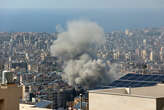On September 26, Hurricane Helene made landfall in the Big Bend region of Florida. Since then, Helene has swept across the Southeast, demolishing homes, and leaving many cities without water and electricity. According to NBC News, more than 200 people have died as a result of the hurricane’s destruction.
Since the Hurricane made landfall, first responders have been on the frontlines helping people who’ve been affected, removing debris, and providing food and water, and medical aid. And many first responders from states like Alabama, New Jersey, and New York have crossed state lines to help others.
But the important work first responders do doesn’t start with the strike of a hurricane. First responders work tirelessly to make sure as much preparation is done before a natural disaster hits. Here’s what it is like to be, and become, a first responder.
Before the storm
First responders volunteering through Team Rubicon, a nonprofit specializing in disaster response, started preparing for Hurricane Helene as early as May. However, they train all year to ensure that they are ready for any disaster that strikes.
The organization regularly conducts what they call a “tabletop exercise” in which all the volunteers learn their roles for the coming months. During this exercise, they also plan out procedures for the next few months, from communication to equipment to training.
When first responders begin training they typically choose which field of work they are most interested in. For instance, first responders can learn how to coordinate with fire departments, how to use heavy equipment like chainsaws, or how to provide medical care.
“I like to use sports analogies, that in the entire emergency management system, you can’t assemble the winning team on the day of the game,” says Art delaCruz, CEO of Team Rubicon. “You have to practice, you have to train, you have to collect the right people to do it.”
A typical day as a first responder
DelaCruz explains that his team lives by a saying: “Do what you do best and outsource the rest.” For this reason, Team Rubicon volunteers often do tasks such as making sure roadways are clear for other first responders, emergency medics, and supply deliveries.
Recently, Team Rubicon volunteers cleared over 20 acres of covered roadways, which equates to about 16 football fields, 10,000 cubic yards, and “1,050 dump trucks” of debris, according to delaCruz.
When not out in the field, first responders often sleep on cots in highschool gymnasiums, camp on the side of roads, or live in their trucks.
Teams of first responders typically have systems in place to establish a feeling of camaraderie and promote safety. This ranges from doing a safety briefing before every new work site to debriefing about each day and what they encountered.
“We talk about it internally as a campfire where we can sit around…and share the stories of the day,” explains Jacob Nilz, senior associate of training at Team Rubicon. Nilz stresses how important it is for first responders’ mental health to share stories, process the tragic events they have seen and “to offload the mental and emotional stuff we’re experiencing every day.”
Every group of first responders has an experienced team leader with them as well as a medical person. They emphasize the mentality that each individual is a safety officer and they all team members are meant to look out for each other and keep each other safe.
A range of first responders
While Team Rubicon focuses on clearing roads, other kinds of first responders focus on providing essential goods and services to people who have experienced natural disasters.
Dr. Parinda Khatri, CEO of Cherokee Health Systems in Knoxville, Tennessee says that the hurricane has left many without access to water and medical supplies.
Khatri says the municipal water supply in Knoxville, Tennessee is out and that she was told that it could be two or three weeks before it gets restored. “Our team went to like 12 grocery stores, got 200 or 300 cases of water, ran out by 11:30 yesterday,” she says. The community is also running out of medical supplies says Khatri, noting that their only pharmacy in Newport is underwater.
Some first responders, such as those who work with Direct Relief, a nonprofit that provides medical supplies during emergencies, are trying to send medical backpacks to help with some of these struggles.
Many Hurricane Helene survivors and first responders are also struggling with communication because cell coverage is shut down in many rural areas.
Footprint Project, an organization devoted to giving communities clean energy during crises, has sent out first responders who distribute portable batteries and solar power. So far Footprint Project has distributed batteries which are helping to run oxygen tanks at a health and rehabilitation center, as well as three mobile home communities without power or water. In one community that depends on well water, Footprint Project provided portable power which has helped to get the well running again.
Together, these different first responders are working tirelessly to help people get the supplies and safety they need. Next, communities will start to rebuild.









No comments